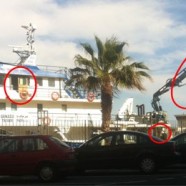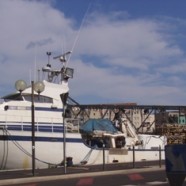Probo Koala : The Death Boat heading to the Cemetery
The Probo Koala vessel which spread death and panic in Abidjan during the summer of 2006 has just been sold by her last owner to a demolisher in Bangladesh for $ 7.7 million. Currently off the coast of China, she should be beached in Chittagong under the name of Gulf Jash within the next few days. The Greek owner had in fact sold the Probo Koala to Gulf Navigation based in Dubai.
Built in 1989, at Korean Shipbuilding & Engineering shipyards, the Probo Koala was used by the multinational company Trafigura to produce low-grade gasoline from highly sulphurised oil off the coast of Gibraltar and Malta. The toxic residue produced by these onboard refinery operations was unloaded in August 2006 at the Abidjan port. Scattered around the Ivory Coast economic capital, the residue containing hydrogen sulphide and mercaptans caused the death of 17 people and intoxicated over one hundred thousand others, according to the official figures.
Wood Energy massacres trees and biodiversity
Chainsaws are impatient and are cutting down without letting up. They are pairing up with wood shredders that reduce fallen trees into fuel. Nothing comes through alive; hundred year old, notable, or isolated trees, tree-lined avenues, and forests. Any excuse will do; they block the sun, they obstruct the view, they are sick, they interfere with the train, they accumulate starlings, are dangerous for road safety, and even hedges are not safe. France is burning since the government, ADEME (Environmental Agency and Energy Control) and environmentalists have promoted forests to the level of renewable energy and the collective and individual heating using wood is spreading like an epidemic. Right-minded people and smooth talkers are busy forming their energy packages, offering it to voters while looking elsewhere; Amazon, Indonesia, and the island of Borneo with insincere crocodile tears.
The After Shock
Climatic, geological, or anthropogenic natural disasters produce in a couple of seconds, hours or days, enormous amounts of waste, so much so that authorities are unable to handle the quantity with ordinary means. The rupture of “lifelines”, namely water, electricity, transportation routes and communication lines, send survivors into a deep confusion. The accumulation of rubble and waste increases the shock of the populations and postpones the first steps towards the return to normalcy.
The 3 million tonnes of rubble generated by the earthquake in Los Angeles in January 1994 led the city to reinforce and multiply its recycling capacities. Provisional transit and elimination sites for future earthquakes were pre-selected.
The After Shock
Climatic, geological, or anthropogenic natural disasters produce in a couple of seconds, hours or days, enormous amounts of waste, so much so that authorities are unable to handle the quantity with ordinary means. The rupture of “lifelines”, namely water, electricity, transportation routes and communication lines, send survivors into a deep confusion. The accumulation of rubble and waste increases the shock of the populations and postpones the first steps towards the return to normalcy.
The 3 million tonnes of rubble generated by the earthquake in Los Angeles in January 1994 led the city to reinforce and multiply its recycling capacities. Provisional transit and elimination sites for future earthquakes were pre-selected.
Libya still Manages their Embassy in Sète
Despite the current conflict and the break in diplomatic relations between France and Libya, the city of Sète and its tourist heart continue to represent Libya, as always without problem, the regime of the famous colonel. Ten tuna fishing boats proudly claiming their homeport and their administrative and financial connections with Tripoli adorn the streets and terraces of the cafés. The riverboats in Sète departing the old city’s bridge leave to the right a part of the Libyan fleet while declaiming through a megaphone, “Since forever the tuna fishing boats of Sète fish for bluefin tuna exclusively in the Mediterranean.”
A stream of Information
The ocean is still considered as a trash can. Radioactive releases by Japan are increased by a decrease of vigilance. What is occurring in the Pacific Ocean is probably inevitable. However it is not excusable nor should it be viewed as routine as many scientific experts in dispersion and farfetched comparison are currently stating. This type of practice would be impossible in the North East Atlantic. Contracting Parties to the OSPAR Convention follow carefully step by step the slow progression of iodine 131, of cesium 137 and of plutonium released by nuclear installations along the Channel and the North Sea to the Arctic Ocean.











